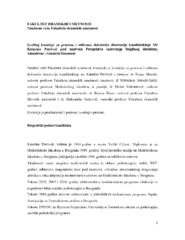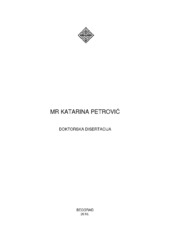Приказ основних података о запису
Перспектива сазревања фрагилног идентитета; Алмодовар: Гранични феномени
| dc.contributor.advisor | Mandić, dr Tijana | |
| dc.contributor.other | Vuksanović, dr Divna | |
| dc.contributor.other | Škorc, dr Bojana | |
| dc.contributor.other | Janković, dr Aleksandar | |
| dc.contributor.other | Jašović Gašić, dr Miroslava | |
| dc.creator | Petrović, Katarina | |
| dc.date.accessioned | 2016-05-17T13:51:10Z | |
| dc.date.available | 2016-05-17T13:51:10Z | |
| dc.date.issued | 2016.09.27. | |
| dc.date.submitted | 2016-05-17 | |
| dc.identifier.uri | http://eteze.arts.bg.ac.rs/handle/123456789/145 | |
| dc.description.abstract | Ovo istraživanje predstavlja psihološko-psihijatrijsku analizu u oblasti filmske umetnosti . Polazi od problemski definisanog predmeta istraživanja koji se odnosi na fenomen „paradoksalnog optimizma“ specifično uobličenog u interpretaciji Pedra Almodovara. Autor je u svojim filmovima u centar interesovanja postavio prototip junaka koji u evropskoj kulturi poznog XX veka manifestuje traume uklapanja u nekoherentnu strukturu savremenog sveta i koji anagažuje ekstremna, nepredvidiva, klinički upadljiva ponašanja. Zbog kompleksnosti samog predmeta istraživanja koji nameće suštinsko pitanje „da li je istinski susret među ljudskim bićima još uvek moguć,“ istraživanje je usmereno na dublju analizu pojedinca i odnosa pojedinca i njegovog mikro i makro miljea, korišćenjem teoretskih modela savremene razvojne psihodinamske školeteorije objektnih odnosa i self psihologije i teoretskim konstruktima egzistencijalnofenomenološke škole. Minucioznom selekcijom je realizovan izbor Almodovarovih filmova koji omogućava sagledavanje dinamike razvoja likova sa fragilnim identitetom. Klinička psihologija i psihijatrija u Almodovarovim likovima nailaze na entitete koji se paradigmatično uklapaju u dijagnostičku kategoriju poremećaja ličnosti sa graničnom strukturom. Intenzivne emocije koje pokreću ove ličnosti su frenetična potreba i žudnja za ostvarenjem bliskosti i njihov očajnički pokušaj da ostvare autentičnu komunikaciju sa značajnim drugim. Ovakav koncept interponira sa egzistencijalno - fenomenološkim stavovima u psihijatriji koji zastupaju ideju da je čovek od momenta rođenja podvrgnut dejstvu društvenih sila koje određuju pojam „normalnosti“, tako da psihopatologiju sa kojom se susrećemo u Almodovarovim filmovima prepoznajemo kao neuspeh pojedinca da se prilagodi takvom zadatom konceptu normalnosti. Tragajući za istinom skrivenom u slojevima umetničkog dela, razotkrivanjem paradoksalnog okvira u sklopu komunikacijskih klišea, ovo istraživanje pruža perspektivu introjekcije fenomena “paradoksalnog optimizma ”u mozaik psihološke i psihijatrijske teorije i prakse. | sr |
| dc.description.abstract | This research is a psychological and psychiatric analysis within the field of film arts, being founded on the problematically defined research subject which refers to the phenomenon of “paradoxical optimism”, specifically shaped in Pedro Almodovar’s interpretation. The author’s focal point of interest in his films is the prototype of a hero who, in the European culture of the late twentieth century, manifests the traumas of adjusting to the incoherent structure of modern world and exhibits extreme, unpredictable, clinically conspicuous behaviour. Owing to the complexity of the very subject of the research imposing the essential question “whether the true encounter amongst human beings is still possible”, the research is aimed at a deeper analysis of an individual and the relationship between the individual and his/her micro and macro milieus, by using the theoretical models of the contemporary psychodynamic developmental school – the object relations theory and self psychology and the theoretical constructs of the existential-phenomenological school. The meticulous selection of Almodovar’s films enables understanding the dynamics of the development in characters with a fragile identity. Clinical psychology and psychiatry in Almodovar’s characters encounter entities that paradigmatically fit into the diagnostic category of personality disorders with borderline structure. Intensive emotions that move these personalities are a frenetic necessity and craving for achieving closeness and their desperate attempt to establish an authentic communication with the significant other. This concept is in accordance with the existential-phenomenological attitudes in psychiatry which suggest that Man has been subjected to the effect of social forces determining the concept of “normality”. Consequently, the psychopathology, encountered in Almodovar’s films, is recognized as an individual’s failure to adjust to the given concept of normality. Searching for the truth hidden within the layers of a work of art, revealing the paradoxical framework within the communication clichés, this research provides a perspective of the “paradoxical optimism” phenomenon introjection in the mosaic of the psychological and psychiatric theory and practice. | sr |
| dc.language.iso | srp | sr |
| dc.publisher | Универзитет уметности у Београду, Факултет драмских уметности | sr |
| dc.source | Факултет драмских уметности | sr |
| dc.subject | Almodovar | sr |
| dc.subject | Almodovar | sr |
| dc.subject | self | sr |
| dc.subject | paradoxical optimism | sr |
| dc.subject | borderline structure | sr |
| dc.subject | phenomenology | sr |
| dc.subject | self | sr |
| dc.subject | paradoksalni optimizam | sr |
| dc.subject | granična struktura | sr |
| dc.subject | fenomenologija | sr |
| dc.title | Перспектива сазревања фрагилног идентитета; Алмодовар: Гранични феномени | sr |
| dc.title.alternative | THE PERSPECTIVE OF THE FRAGILE IDENTITY MATURING; ALMODOVAR − BORDERLINE PHENOMENA | sr |
| dc.type | doctoralThesis | en |
| dcterms.abstract | Мандић, др Тијана; Вуксановић, др Дивна; Шкорц, др Бојана; Јанковић, др Aлександар; Јашовић Гашић, др Мирослава; Петровић, Катарина; Perspektiva sazrevanja fragilnog identiteta; Almodovar: Granični fenomeni; |


